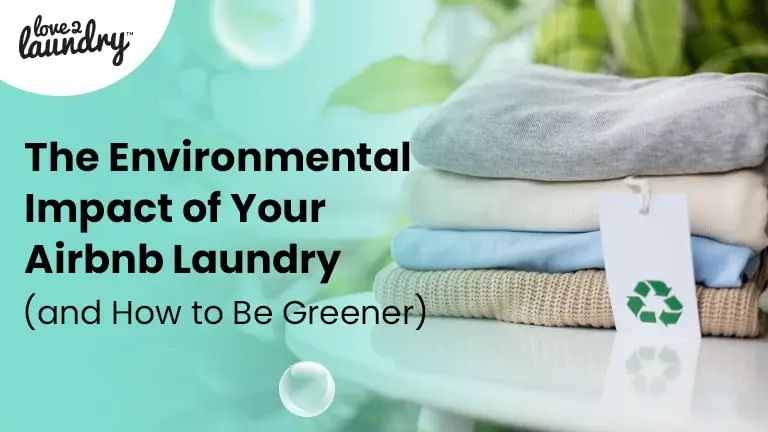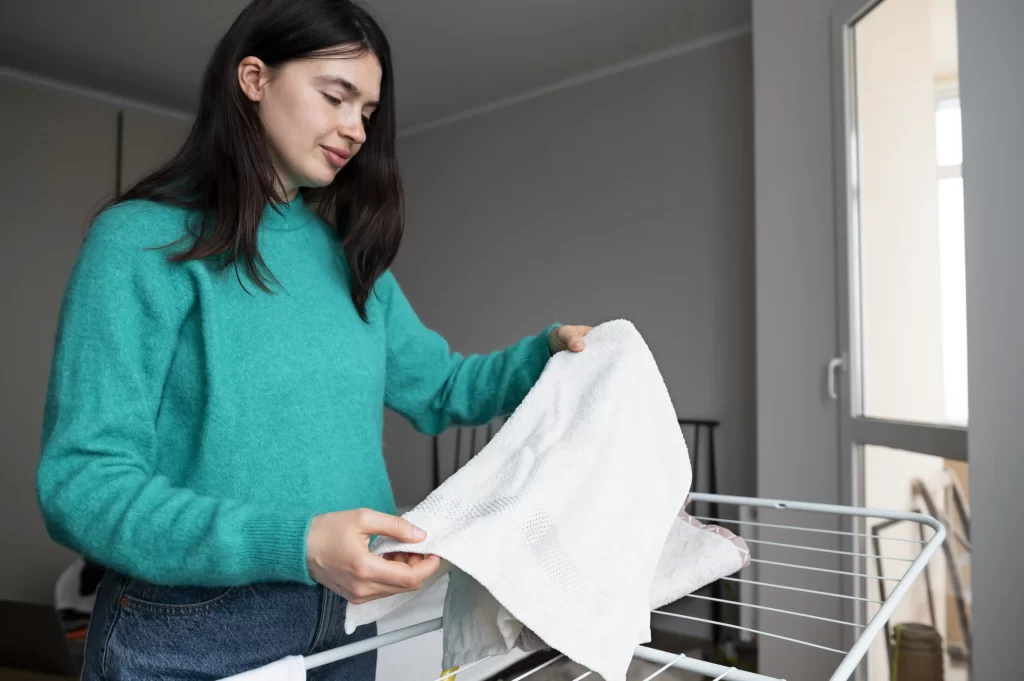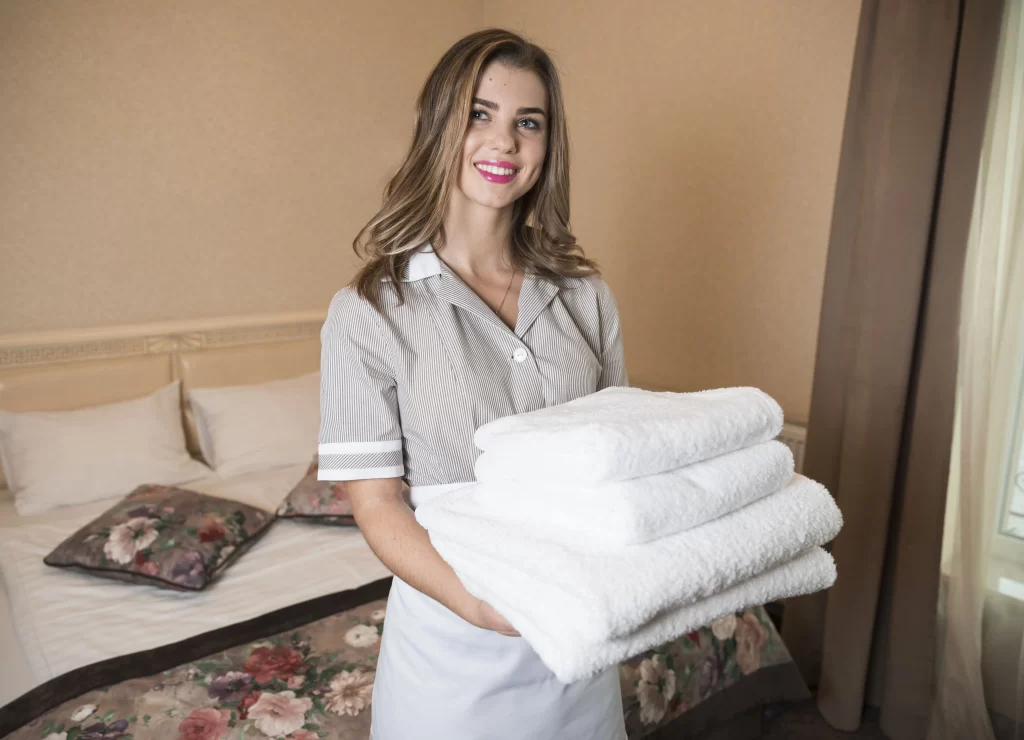
The Environmental Impact of Your Airbnb Laundry (and How to Be Greener)
As an Airbnb host or property manager, the pressure to provide impeccably clean and fresh accommodations for every new arrival is always pressing. This constant laundry turnover leads to a non-stop exercise of washing, drying, and folding. This regular changing is essential for guest satisfaction and positive reviews, but has a hidden consequence of a significant environmental footprint.
The volume of Airbnb laundry in short-term rental cycles consumes an extraordinary amount of resources. Multiple loads per property translate to vast quantities of water for heating and drying, and a steady stream of detergents and cleaning chemicals being released into our ecosystems. This intensive process contributes to increased carbon emissions, water pollution, and chemical runoff, quietly yet consistently impacting our ecological environment.
Many hosts believe that maintaining immaculate cleanliness and adopting greener practices are simply too time-consuming or unachievable together. The reality is that sustainable laundry service for Airbnb can reduce your environmental impact and enhance your brand image, attracting a growing segment of environmentally conscious travellers.
This blog is your practical, easy-to-follow guide to transforming your Airbnb laundry routine into a more sustainable operation. We’ll explore actionable strategies and smart choices that allow you to significantly reduce your environmental footprint.
Why Airbnb Laundry Has a Bigger Environmental Footprint
Airbnb laundry generates a disproportionately larger environmental footprint compared to typical household laundry. This stems from the high turnover rate inherent in short-term rentals, leading to significantly more frequent washing and drying cycles.
Unlike a personal residence, where linens might be changed weekly, Airbnb properties often see daily or bi-weekly changes, which means washing machines and dryers are in heavy use. Moreover, the sheer volume of laundry necessitates the frequent use of detergents and chemicals, contributing to water pollution and chemical runoff into our waterways.

The Water & Energy Challenge
- Frequent laundry for Airbnb users uses huge amounts of water daily.
- Constant hot washes increase electricity and gas consumption.
- Strains local water supplies, especially in high-tourism areas.
- Raises utility bills for Airbnb hosts significantly over time.
- Adds carbon emissions from energy-intensive dryers.
- Older machines waste more resources compared to eco-models.
- Shortens fabric life due to aggressive washing cycles.
- Switching from DIY Airbnb laundry to professional eco-services can cut usage.
The Hidden Chemical Problem
- Standard detergents contain phosphates that pollute waterways.
- Chlorine bleach harms aquatic life and ecosystems.
- Fabric softeners leave residues toxic to marine organisms.
- Overuse of chemicals damages linen fibres prematurely.
- Residual scents can irritate sensitive guests.
- Harsh formulas require more rinses, wasting water.
- Eco-friendly detergents lower environmental impact.
- Many Airbnb linen rental providers use certified green products.
Microfiber Pollution in the Hospitality Industry
- Synthetic fabrics shed microfibers with every wash.
- These tiny plastics enter rivers, lakes, and oceans.
- Fish and marine wildlife ingest microfibers.
- Hospitality laundry volumes multiply the problem.
- Dryers also release airborne microplastics into the environment.
- Natural fabrics shed far fewer harmful particles.
- Laundry bags can trap some microfibers before they escape.
- Eco-minded services use filters to reduce microfiber release.
Greener Airbnb Laundry Practices That Still Impress Guests
Choosing eco-friendly laundry methods is about protecting the planet. By reducing water, energy, and chemical use, you can cut costs, extend linen life, and appeal to the growing number of eco-conscious travellers.
Guests appreciate fresh, spotless linens that come with a smaller environmental footprint, making your listing stand out for all the right reasons. For more practical steps, check out the complete guide to Airbnb laundry.

Choose Eco-Certified Detergents
Eco-certified detergents are made with plant-based and biodegradable ingredients, free from phosphates, chlorine, and other harsh chemicals. They help reduce harmful runoff into waterways while being gentle on fabrics, extending the lifespan of linens.
These detergents are often hypoallergenic, making them ideal for sensitive guests, and they usually require less rinsing, which saves water. With recyclable or minimal packaging, they appeal to eco-conscious travellers who value sustainable practices.
Optimise Wash Loads
Running full wash loads maximises efficiency and reduces water and energy use per cycle. At the same time, avoiding overloading ensures better cleaning results and prevents excess wear on both fabrics and machines.
Optimised wash loads cut down the total number of washes needed, which lowers utility bills and prolongs equipment life. This practice also helps detergents work more effectively and balances the laundry workload for smoother turnovers.
Wash in Cold or Low-Temperature Cycles
Washing laundry in cold or low-temperature cycles uses significantly less energy than hot washes, making it an eco-friendly option. It helps prevent shrinkage, fading, and loss of elasticity in fabrics while still being effective for most daily laundry needs.
Modern detergents are designed to perform well in cooler water, which further enhances cleaning efficiency. This approach reduces carbon emissions, lowers utility costs, and keeps delicate fabrics safe.
Skip the Dryer When Possible
Air drying laundry is one of the most effective ways to save energy while extending the lifespan of linens. Without exposure to heat, fabrics remain stronger and avoid damage, while also retaining a fresh, natural scent.
Air drying reduces static and wrinkles and eliminates the release of microfibres through dryer vents. This method is easy to implement with indoor drying racks, making it a practical and eco-friendly alternative to machine drying.
Invest in High-Efficiency (HE) Machines
High-efficiency (HE) machines are designed to use less water and consume less energy per load, making them both cost-effective and environmentally friendly. They feature faster, more powerful spin cycles that remove more water, which shortens drying times.
These machines are gentle on fabrics, reduce long-term operating costs, and often include eco-friendly wash settings. In many cases, HE models also qualify for energy efficiency rebates, adding extra value for businesses and households alike..
Use Laundry Bags to Reduce Microfiber Shedding
Using laundry bags is a simple yet impactful way to reduce microfiber shedding from synthetic fabrics. These bags trap microfibres before they enter waterways, protecting the environment while extending the life of delicate garments.
They are affordable, reusable, and easy to incorporate into existing laundry routines, working seamlessly with any washing machine. By adopting this practice, you not only lower pollution from hospitality laundry volumes but also show guests your commitment to ocean health.
How Love2Laundry Helps Airbnb Hosts Go Green
Love2Laundry gives a reliable solution for Airbnb hosts who are ambitious to reduce their environmental footprint without adding to their workload. As a dedicated Airbnb laundry service, we implement a range of eco-friendly practices. Our convenient pick-up and drop-off services significantly cut down on the multiple car trips hosts would make, reducing carbon emissions.
Within our facilities, Love2Laundry utilises energy-efficient machines and prioritises the use of biodegradable, eco-friendly detergents, minimising chemical impact on waterways. While specific details on water recycling might vary by location, their overall commitment is to a more sustainable operation, positioning them as a hassle-free and greener alternative for busy Airbnb hosts.
The Benefits of Going Green with Your Airbnb Laundry
We have a wide range of out-of-the-box benefits that will help the Airbnb hosts go green:
- Cuts water and energy use, reducing your utility bills instantly.
- Extends the life of towels and sheets through gentle, eco-friendly washing.
- Attracts eco-conscious guests who want and appreciate green practices.
- Promotes your listing’s appeal, leading to better reviews and repeat bookings.
- Uses non-toxic detergents, keeping linens safe for all guests.
- Minimises machine wear, lowering long-term maintenance costs.
- Offers an Airbnb linen service with sustainable washing methods.
- Delivers fresh, crisp linens that still meet hotel-level standards.
- Helps market your listing as an environmentally responsible stay.
- You can provide an Airbnb cleaning and linen service that streamlines turnovers.
- This approach reduces resource waste compared to standard Airbnb laundry setups.
- Supports your business growth while aligning with global eco trends.
Quick Green Laundry Checklist for Airbnb Hosts
Making your Airbnb laundry practices more sustainable doesn’t have to be a tremendous task. With a few simple adjustments and conscious choices, hosts can significantly decrease their environmental impact and still provide guests with clean linens.
This helpful table gives actionable steps to help you adopt a more sustainable approach to your Airbnb laundry. It’s all about finding practical ways to be greener in your operations:
| Room | Item | Green Laundry Practice |
| Laundry Room | Washing Machine Settings | Always opt for cold water cycles to save energy, as modern detergents are designed to work effectively in cooler temperatures. |
| Detergent & Softener | Use eco detergents that are biodegradable, free of phosphates, and packaged sustainably. Consider dryer balls as a natural alternative to chemical fabric softeners. | |
| Washing Frequency | Avoid over-washing towels and linens that have only been lightly used. Encourage guests to reuse towels with polite signage. | |
| Drying Method | Air dry when possible! Install clotheslines or drying racks. For machine drying, use low heat settings and clean the lint trap for efficiency. | |
| Guest Rooms | Linen Selection | Opt for durable, high-quality linens made from sustainable materials like organic cotton or bamboo, which tend to last longer and reduce replacement frequency. |
| Towel Re-use Program | Communicate a towel re-use program to guests, such as hanging towels to reuse and placing them on the floor for fresh ones. | |
| External Services | Professional Laundry/Linen | If you utilise an Airbnb laundry service, inquire about their eco-certifications and practices. Prioritise services that use green detergents, efficient machinery, and responsible waste disposal. |
FAQs – Eco-Friendly Airbnb Laundry
Can I still achieve hotel-level cleanliness with eco-friendly methods?
Yes, Airbnb laundry can be both eco-friendly and spotless by using plant-based detergents and energy-efficient machines. These methods ensure fresh, crisp linens without harsh chemicals.
How do I convince guests I’m using sustainable laundry practices?
Showcase your how to be greener approach through clear signage, eco-certifications, or behind-the-scenes photos. Transparency builds trust and highlights your commitment to the planet.
What’s the cost difference between regular and eco laundry?
An Airbnb laundry service using eco-methods may cost slightly more upfront, but it saves in the long run. Partnering with an Airbnb linen service can help balance quality with affordability.
Wrap Up!
It’s clear that even something as seemingly simple as Airbnb laundry carries a significant environmental footprint. But the good news is, armed with awareness and a commitment to change, we can collectively lighten this load.
By making conscious choices, we can alter laundry day from an environmental disadvantage into an opportunity for positive impact. Consider exploring an Airbnb laundry service if you’re managing multiple Airbnb properties or an Airbnb linen service that prioritises sustainability.
This way you can easily implement how to be greener practices without added hassle. Let’s make every wash count towards a more sustainable future, one load of eco-conscious linen at a time! To get started with greener solutions, book now!



